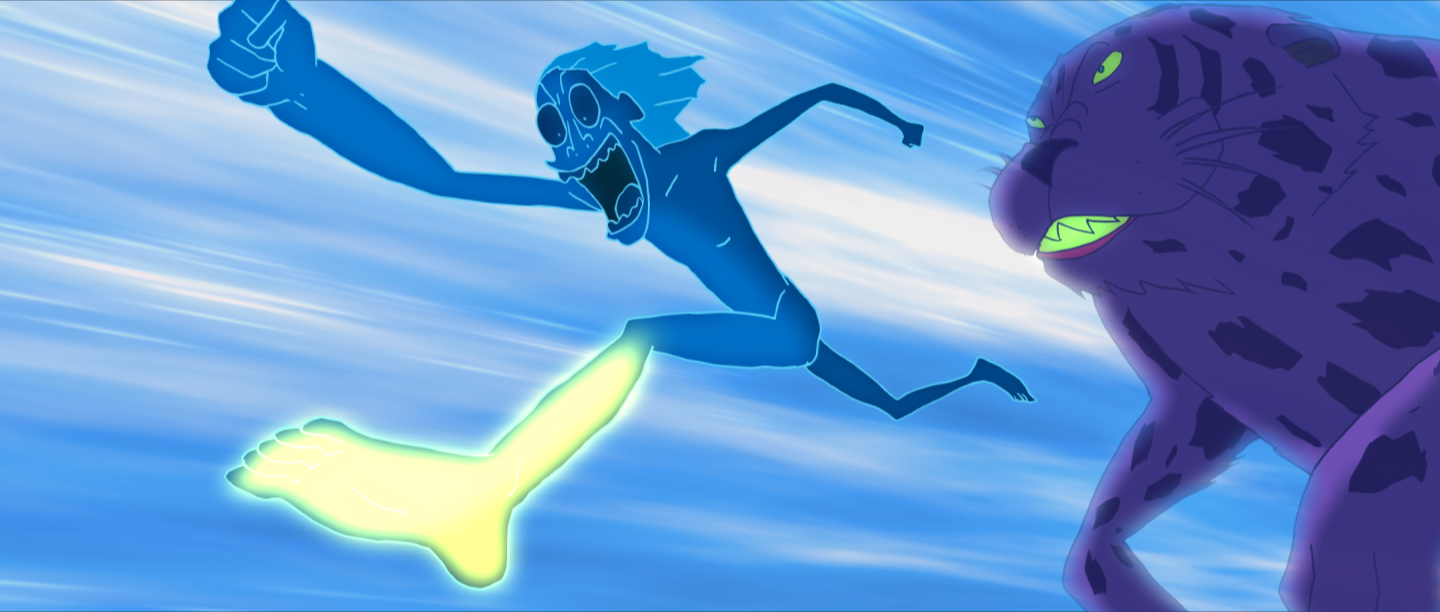Do beta males go to heaven? In the first of director Masaaki Yuasa’s five anime features, 2004’s Mind Game, the answer is no. Nishi (Koji Imada), the film’s incel hero, ascends to a kind of Burger King-Pizza Hut hell-purgatory, where a continuously shapeshifting God forces him to watch his emasculating murder — which occurred in front of the woman he loves, by the gun of a deranged yakuza-cum-soccer star — on loop: muzzle to ass, bullet to hole, muzzle to ass, bullet to hole. The comic cruelty snowballs until Nishi breaks down and God, in his severely limited mercy, stops the playback and instructs the wailing loser to hurry through a red-and-black portal to oblivion. The deceased obediently shuffles toward nonexistence; he accepts his fate — and then he doesn’t. A blue-and-white portal shimmers in the opposite direction. He runs to life. God pursues.
They race for over a minute. Desperation and resolve distort Nishi’s face; his legs fade to nothing then reappear beneath him. “I’m gonna take care of that creep! Be stronger! Determined! Free and happy! Live life to the fullest!” he screams, bursting through a hole between worlds. Resurrected in the seconds before his death, Nishi uses his ass, in which the yakuza has buried a pistol, to snatch the firearm and blast its owner. If Nishi’s perverse execution sequence self-consciously instantiates a brand of “straight male gaze” defined by its intertwined fears of penetration and identification with femininity, his rebirth embraces bottoming. Saying “yes” to life involves being less closed off, more receptive.
Yuasa, a director famous for unleashing strange, bracing torrents of visual styles — in Mind Game, voice actors’ real faces will suddenly replace their animated doubles; solid-seeming character models will begin to undulate and stretch against candy-flip eruptions of color — delights in making his characters run for their lives. Two of his recent series, the deservedly lauded, hyper-violent Devilman Crybaby (2018) and the treacly but brutal Japan Sinks: 2020 (2020), focus on track stars specifically. Both use minutely observed sprinting scenes, and in particular relay races, to describe the different significations of running: a physical glory, a means of escape, a rush to aid, and a way to pass a baton and so renew the contract of interdependence that handoff symbolizes.
Later in Mind Game, Nishi is lodged in another purgatory, the flooded gullet of a city-size whale. His lone hope of escape? Six minutes of nonstop sprinting. He finds footholds on exploded chunks of boat, an unlucky fish, water itself, a swallowed jumbo jet, even individually animated H2O molecules. This final run practices what the film, and nearly all of Yuasa’s works, preach: a dogged, exuberant engagement with life, the world, with as many worlds as possible, real and imagined, animated and not. Slap them together, watch, rejoice, rewind, do it again, but differently. There’s still more to see.
Mind Game is streaming on the Criterion Channel.





